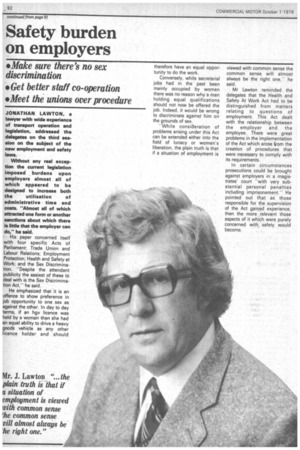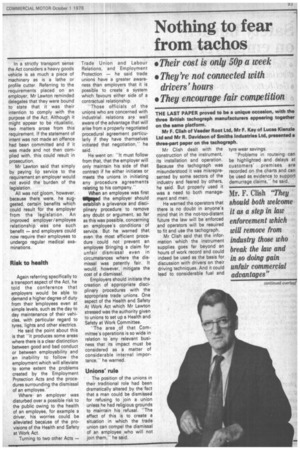Safety burden on employers
Page 94

Page 95

If you've noticed an error in this article please click here to report it so we can fix it.
• Make sure there's no sex discrimination .Get better staff co-operation cifeet the unions over procedure
JONATHAN LAWTON, a lawyer with wide experience of transport operation and legislation, addressed the delegates on the third session on the subject of the new employment and safety laws.
Without any real exception the current legislation imposed burdens upon employers almost all of which appeared to be designed to increase both the utilisation of administrative time and costs. "Almost all of which attracted one form or another sanctions about which there is little that the employer can do," he said.
• His paper concerned itself with four specific Acts of Parliament: Trade Union and Labour Relations; Employment Protection; Health and Safety at Work; and the Sex Discrimination. "Despite the attendant publicity the easiest of these to deal with is the Sex Discrimination Act," he said.
He emphasized that it is an offence to show preference in job opportunity to one sex as against the other. In day to day terms, if an hgv licence was held by a woman then she had an equal ability to drive a heavy goods vehicle as any other licence holder and should therefore have an equal opportunity to do the work.
Conversely, while secretarial jobs had in the past been mainly occupied by women there was no reason why a man holding equal qualifications should not now be offered the job. Indeed, it would be wrong to discriminate against him on the grounds of sex.
-While consideration of problems arising under this Act can be extended either into the field of lunacy or women's liberation, the plain truth is that if a situation of employment is viewed with common sense the common sense will almost always be the right one,he said,
Mr Lawton reminded the delegates that the Health and Safety At Work Act had to be distinguished from matters relating to questions of employment. This Act dealt with the relationship between the employer and the employee. There were great problems in the implementation of the Act which arose trom the creation of procedures that were necessary to comply with its requirements.
In certain circumstances prosecutions could be brought against employers in a magistrates' court -with very substantial personal penalties including imprisonement." He pointed out that as those responsible for the supervision of the Act gained experience, then the more relevant those aspects of it which were purely concerned with safety would become.
In a strictly transport sense the Act considers a heavy goods vehicle is as much a piece of machinery as is a lathe or profile cutter. Referring to the requirements placed on an employer, Mr Lawton reminded delegates that they were bound to state that it was their intention to comply with the purpose of the Act. Although it might appear to be ritualistic, two matters arose from this requirement. If the statement of intent was not made an offence had been committed and if it was made and not then complied with, this could result in prosecution, Mr Lawton said that simply by paying lip service to the requirement an employer would not avoid the burden of the legislation.
All was not gloom: however, because there were, he suggested, certain benefits which could result for the employer from the legislation. An improved employer/employee relationship was one such benefit — and employers could now require their employees to undergo regular medical examinations.
Risk to health
Again referring specifically to a transport aspect of the Act, he told the conference that employers would be able to demand a higher degree of duty from their employees even at simple levels, such as the day to day maintenance of their vehicles, with particular regard to tyres, lights and other electrics.
He said the point about this is that "it produces some areas where there is a clear distinction between good and bad conduct or between employability and an inability to follow the employment which will alleviate to some extent the problems created by the Employment Protection Acts and the procedures surrounding the dismissal of an employee.
Where. an employer was disturbed over a possible risk to the public owing to the health of an employee, for example a driver, his worries could, be alleviated because of the provisions of the Health and Safety at Work Act.
Turning to two other Acts — Trade Union and Labour Relations, and Employment Protection — he said trade unions have a greater awareness than employers that it is possible to create a system which favours either side of a contractual relationship.
"Those officials of the unions who are concerned with industrial relations are well aware of the advantage that will arise from a properly negotiated procedural agreement particularly if they have themselves initiated that negotiation," he said, He went on: "It must follow from that, that the employer will only maintain his side of that contract if he either initiates or meets the unions in initiating any procedure agreements relating to his company."
When an employee was first 11111111111,0d the employer should
establish a grievance and disci plinary procedure to remove any doubt or argument, so far as this was possible, concerning an employee's conditions of service. But he warned that even the most efficient proce dure could not prevent an employee bringing a claim for unfair dismissal even in circumstances where the dismissal was patently fair. It would, however, mitigate the cost of a dismissal.
Employers should initiate the creation of appropriate disci plinary procedures with the appropriate trade unions. One aspect of the Health and Safety At Work Act which Mr Lawton stressed was the authority given to unions to set up a Health and Safety at Work Committee.
"The area of that Committee's operations is so wide in relation to 'any relevant business that its impact must be considered as a matter of considerable internal importance," he warned.
Unions' rule The position of the unions in their traditional role had been dramatically altered .by the fact that a man could be dismissed for refusing to join a union unless he had religious grounds to maintain his refusal. "The effect of this is to create a situation in which the trade union can compel the dismissal of an employee who will not join them," he said.




































































































































































